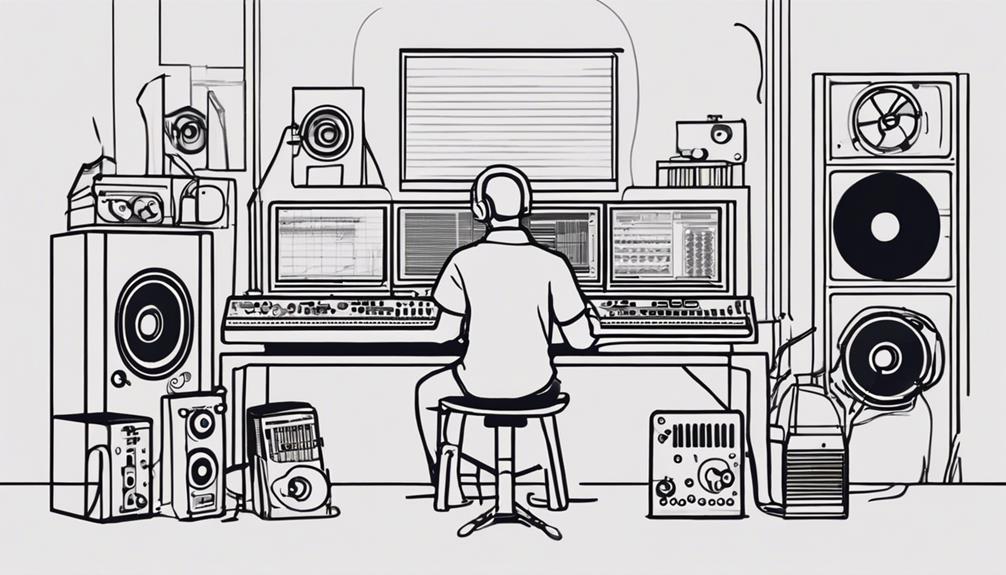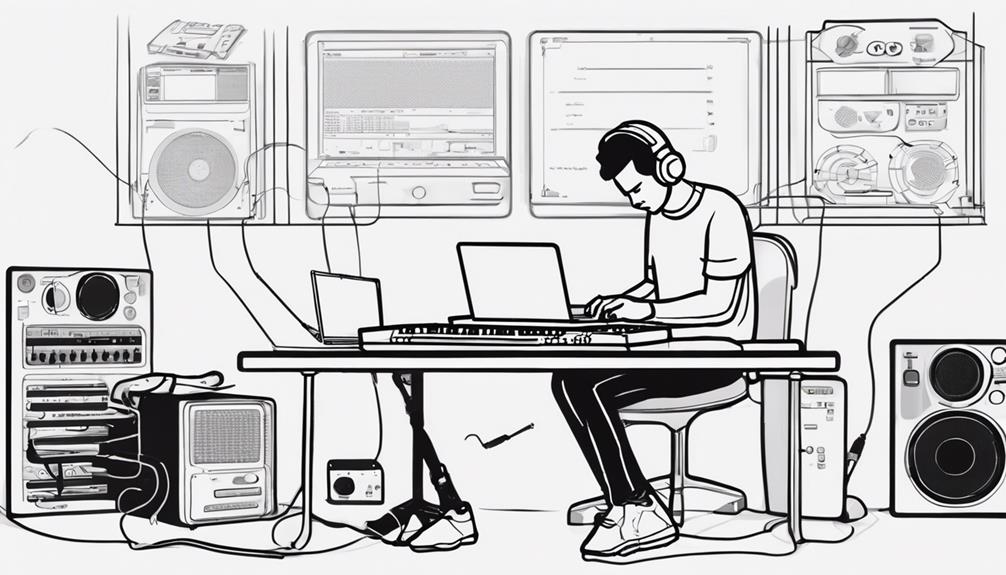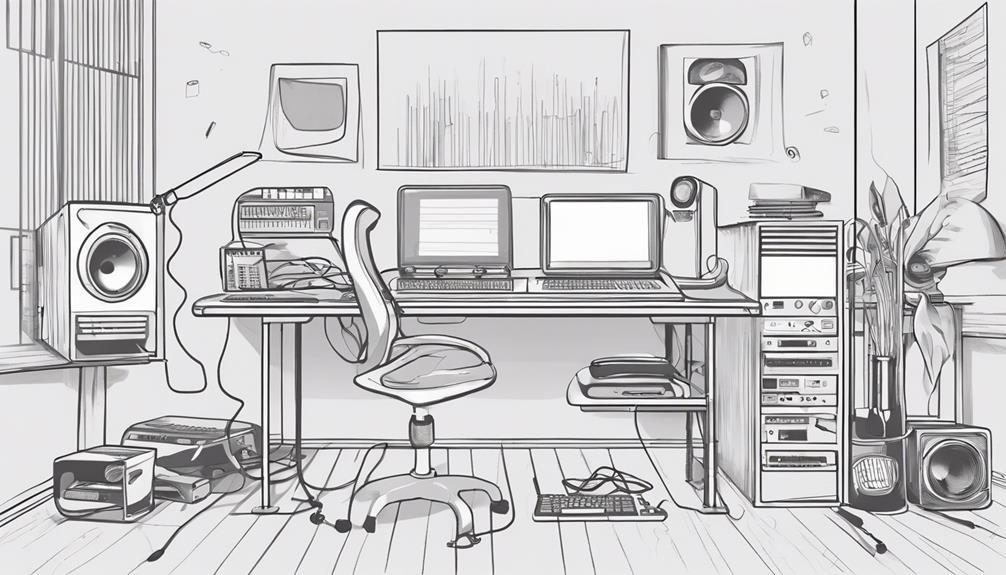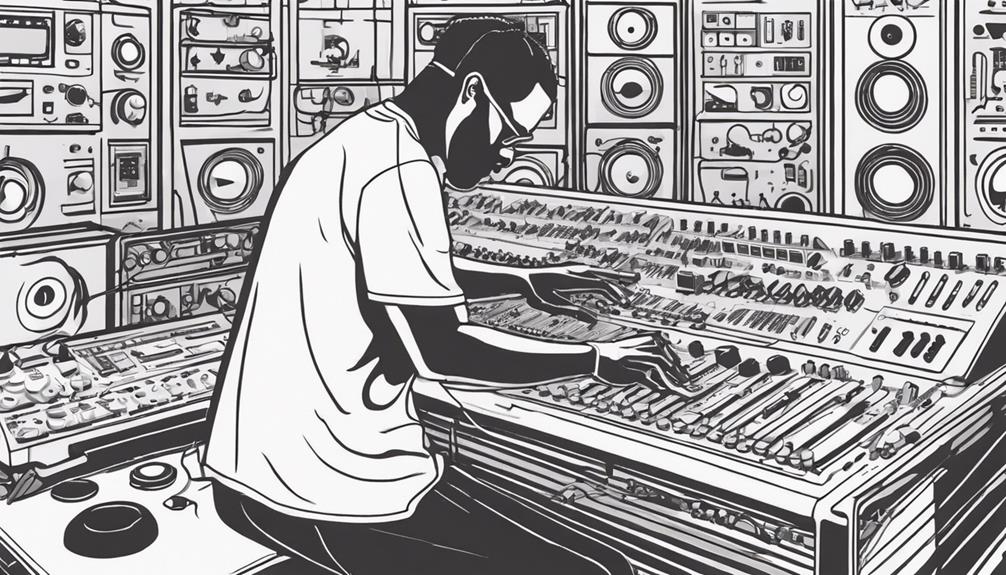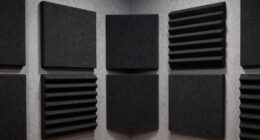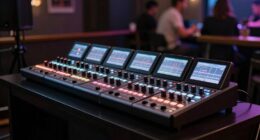Improve your music production skills by mastering music theory. Understand scales, chords, and the Circle of Fifths for harmonically rich tracks. Embrace constructive criticism to identify weaknesses and refine skills. Experiment with genres, tempos, and instruments to spark creativity. Utilize existing gear and software to uncover new sounds. Develop critical listening skills for polished tracks. These strategies will enhance your music production abilities and lead to well-structured compositions, growth from critiques, enriched creativity, optimized gear performance, and refined tracks. So, keep exploring these strategies to take your skills to the next level. Remember, consistency is key—dedicate regular time to practicing and experimenting, as repetition helps solidify concepts and techniques. Collaborate with other musicians and producers to gain fresh perspectives and explore new approaches that can further improve your music production skills. Ultimately, staying curious, adaptable, and persistent will open the door to limitless creative possibilities in your music journey.
Key Takeaways
- Master music theory for cohesive compositions and rich harmonies.
- Seek diverse feedback for growth and refinement.
- Experiment with genres, instruments, and minimalistic arrangements.
- Utilize existing gear features and software functionalities fully.
- Develop critical listening skills for polished tracks.
Mastering Music Theory
To enhance your music production skills, mastering music theory is indispensable. Understanding music theory elements like chords, scales, and key signatures is vital for creating cohesive and engaging compositions.
By delving into the intricacies of music theory, you can access the potential to craft harmonically rich tracks that resonate with your audience.
One valuable tool in your music theory arsenal is the Circle of Fifths, which visually represents the relationships between different notes and keys. This tool can guide you in selecting chords and progressions that flow seamlessly together, leading to more dynamic and well-structured music.
Embracing Constructive Criticism
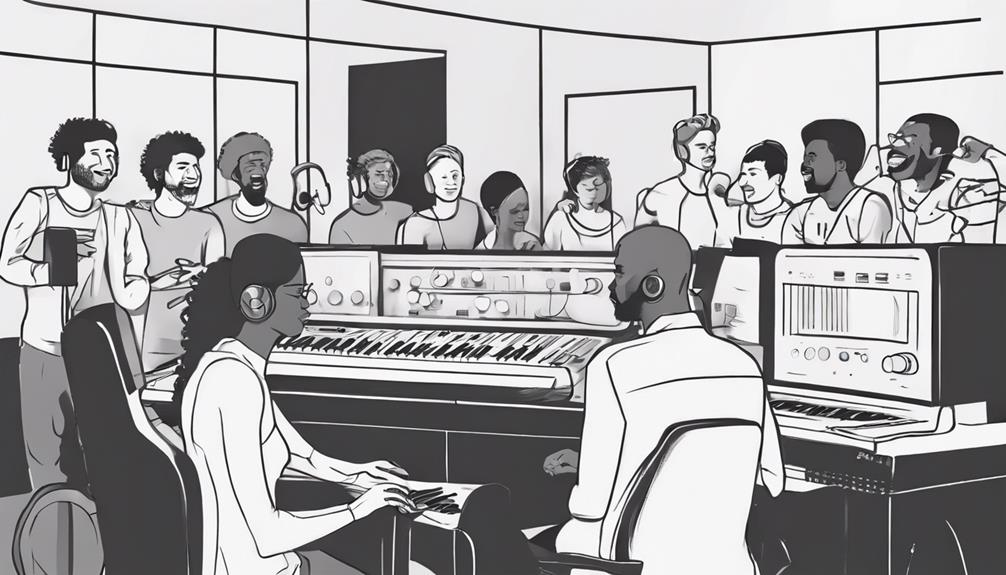
Embracing constructive criticism is essential for refining your music production skills and pushing your creative boundaries. To enhance your journey in music production, consider the following:
- Seek Feedback from Diverse Sources: Engage with experts and non-experts to gather a wide range of perspectives on your music. This diversity can offer valuable insights that you mightn't have considered on your own.
- Actively Listen and Learn: Shift from passive listening to active listening to extract meaningful feedback. Actively engaging with critiques and suggestions can greatly contribute to your growth as a music producer.
- Utilize Constructive Criticism for Improvement: Embrace feedback, especially constructive criticism, to identify and address weaknesses in your tracks. By implementing actionable suggestions, you can enhance both the creative and technical aspects of your music production.
Constantly Experimenting and Innovating
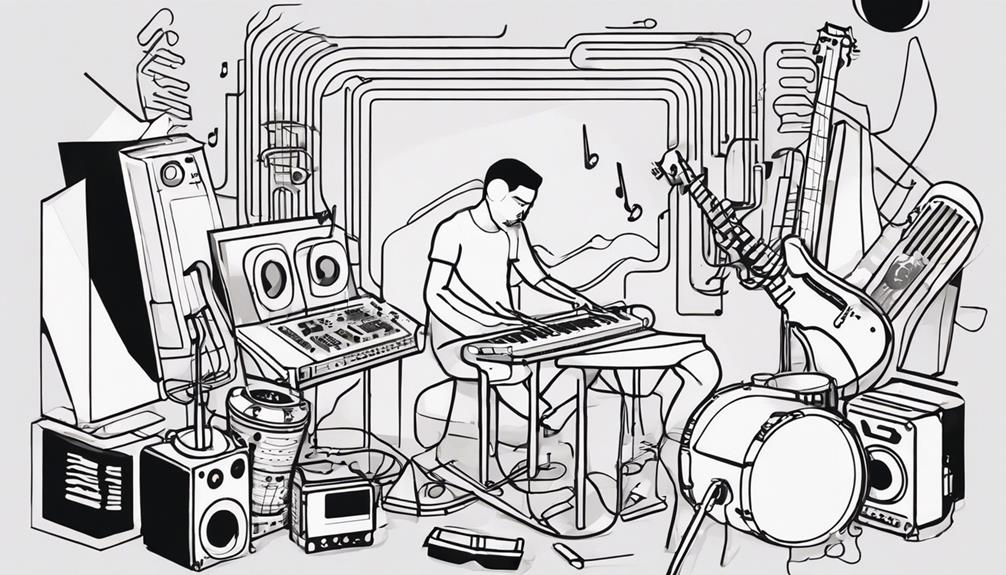
Try experimenting with different genres, tempos, and time signatures to expand your musical horizons. By daring to experiment, you open doors to new sounds and styles that can enrich your music production skills.
Innovate by incorporating unconventional instruments, sounds, and production techniques into your tracks. Embracing innovation allows you to create unique and memorable music that stands out from the crowd.
Challenge yourself to produce music with minimalistic arrangements; this can sharpen your creative skills and help you focus on the essentials of a song.
Explore unique workflows like working backward or producing a song without hearing it to spark fresh ideas and break creative blocks.
Live looping is a dynamic and creative way to compose music on the fly, enabling you to layer sounds, create textures, and improvise in real-time.
Maximizing Existing Gear and Software
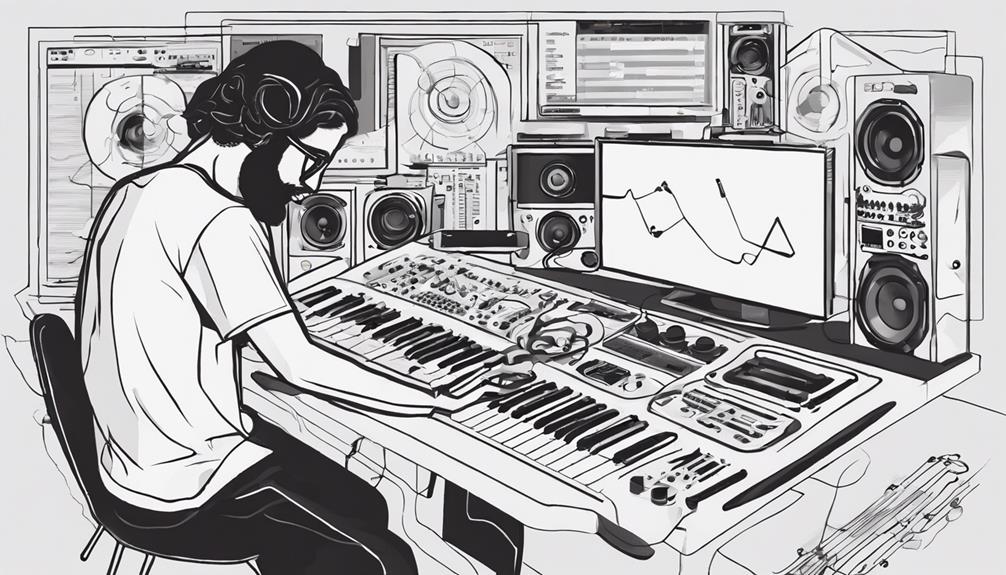
Consider maximizing your current gear and software by mastering their features and functionalities to enhance your music production skills.
To make the most out of what you already have, try the following:
- Explore with Settings: Dive into different settings and presets within your gear and software to uncover new sounds and creative possibilities, pushing the boundaries of your music production.
- Utilize Online Tutorials: Explore online resources and tutorials to discover hidden capabilities and advanced techniques for your existing tools. Learning from experts can provide valuable insights and help you improve your skills.
- Regular Updates and Maintenance: Make sure that your gear and software are up to date and well-maintained. This won't only optimize performance but also extend the longevity of your equipment, allowing you to focus on making music without technical interruptions.
Developing Critical Listening Skills
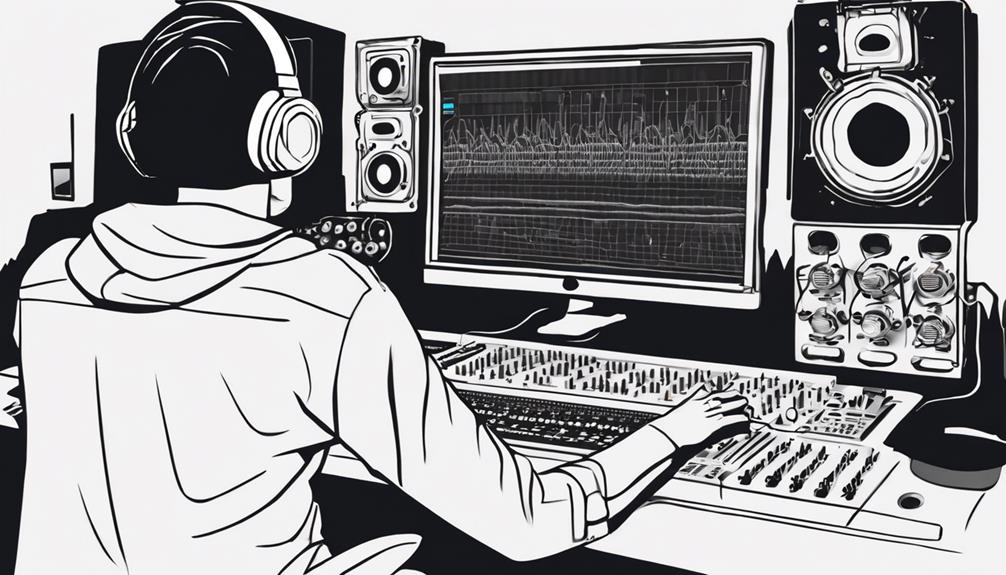
To enhance your music production abilities, focus on honing your critical listening skills to analyze and evaluate various elements of your tracks. Critical listening involves actively appraising production aspects such as EQ, dynamics, and spatial effects.
Train your ears to detect frequency imbalances, stereo image issues, and overall mix clarity. Use reference tracks to compare and identify differences in tonal balance, compression artifacts, and reverberation tails. By focusing on these specifics, you can improve the quality of your music production.
Utilize tools like spectrum analyzers and reference tracks to enhance your critical listening skills further. These tools can help you pinpoint areas for improvement in your mixes. Pay attention to how professional tracks handle different elements, and aim to achieve a similar level of quality in your production.
Developing strong critical listening skills is essential for refining your music production techniques and creating polished, professional-sounding tracks.
Frequently Asked Questions
How Can I Improve My Music Making?
To enhance your music making, delve into music theory essentials like chords and scales. Experiment with various genres to spark creativity. Seek feedback from experts and peers for constructive criticism. Collaborate with others to learn new techniques and broaden your network.
How Do You Level up Your Music Production?
To enhance your music production skills, immerse yourself in music theory, solicit feedback, explore new tools, and concentrate on mastering core skills. Refrain from fixating on gear, enroll in a music production school for hands-on experience. Keep challenging yourself and evolving!
How to Become a Better Music Producer?
To become a better music producer, master music theory basics, seek feedback from experts and peers, experiment with new tools and genres, collaborate with other producers, and keep learning and following industry trends for continuous improvement.
How Do I Improve My Music Knowledge?
To enhance your music knowledge, delve into music theory basics like scales, chords, and keys. Understanding the Circle of Fifths helps create rich harmonies. Mastering these fundamentals aligns compositions with vocalists and elevates your tracks' quality.
Conclusion
To sum up, remember to master music theory,
embrace constructive criticism,
experiment constantly,
maximize gear and software,
and develop critical listening skills to improve your music production skills.
Keep pushing yourself to progress and perfect your craft.
Practice makes perfect, so never stop learning and evolving as a musician.
Stay motivated, stay creative, and stay dedicated to honing your skills.
Elevate your expertise and elevate your music – the possibilities are endless!

